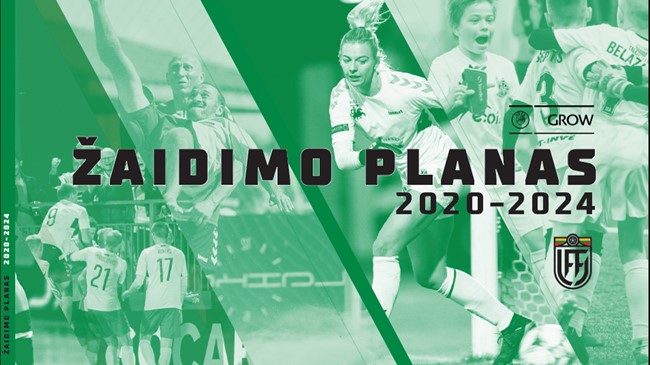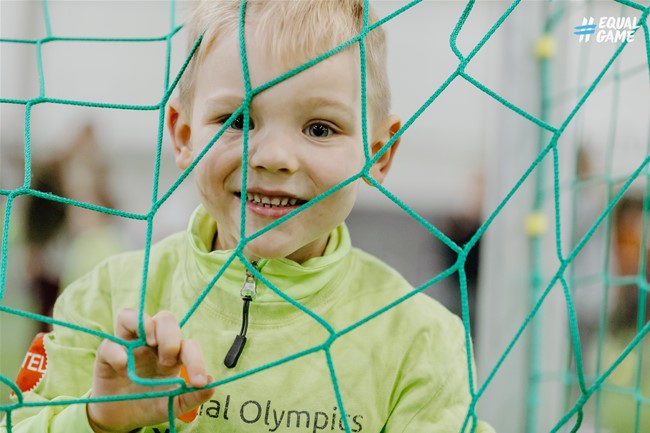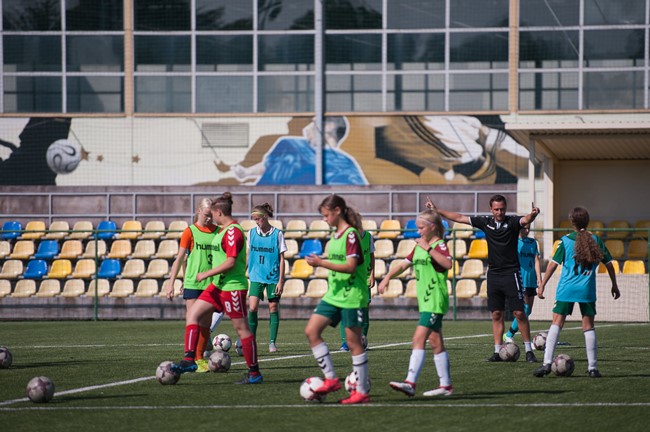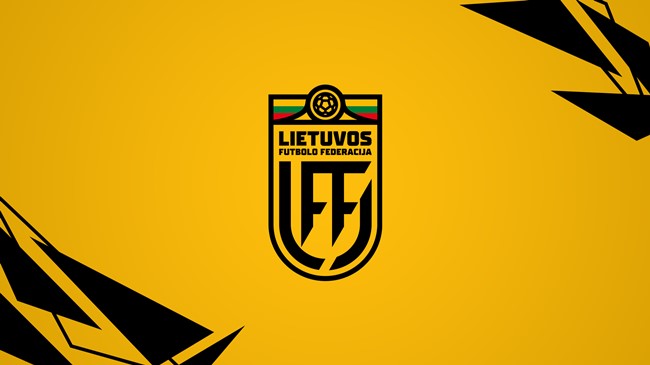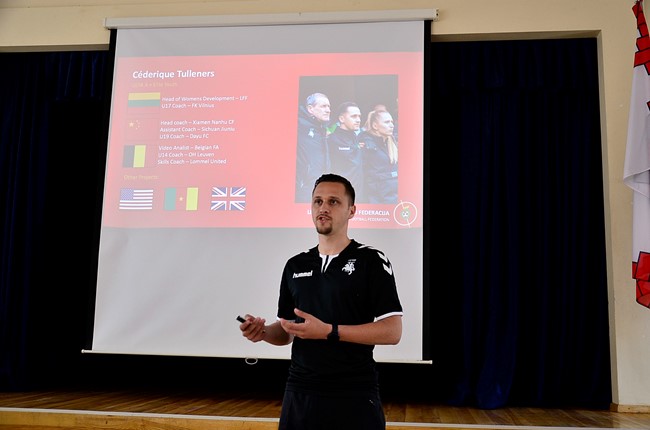On the 18th of December, during the virtual event LFF unveiled their new strategy called “Game Plan 2024”.
The event was hosted by the well-known TV presenter Arunas Valinskas and LFF President Tomas Danilevicius and LFF General Secretary Edgaras Stankevicius attended as main guests.
A. Valinskas expressed support for the Lithuanian Football Federation at the beginning of the event: “Nowadays, talking badly about Lithuanian football generally is considered to be a good thing. The same applies to Lithuanian Seimas – the worse you say something about it, the cleaner you feel. Why am I here? Because I thought that maybe my colleagues from TV, from the stage, from many other places will think that maybe it’s enough to demolish, let’s start building something” said A. Valinskas.
8 priority areas of the LFF strategy were discussed during the event: participation, workforce development, technical development, infrastructure development, elite performance, operational management, women’s football and engagement.
The vision of the Game Plan 2024 is: “Every Lithuanian – inspired by football – enjoying football and fulfilling their dreams.”
Participation
Up to 2020 an important goal has already been achieved – the number of registered football players has risen to 31,000 and football has become the most massive sport in Lithuania. A further goal is to increase this number by reaching 45,000 registered players up to year 2024.
“People, regardless of where they live, in a larger city, town or countryside area, regardless of their social status, skills, gender, age, race or sexual orientation, could find their place in football – from the yard to the professional football career.” – LFF President Tomas Danilevicius spoke during the presentation of the participation area.
The aim in this area will be to increase cooperation with educational institutions and universities, involving them in various LFF activities. There will also be a strong focus on clubs working with educational institutions to ensure the football player’s continuous path.
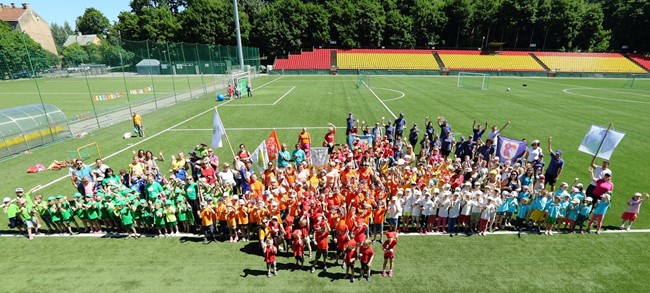
Workforce Development
In order to achieve set goals in the area of participation, it is very important to raise the qualification level of coaches, judges, volunteers and LFF administration staff.
“We aim to show that coaching, refereeing and volunteering are not only attractive activities, but also play a very important role in football. In the near future, we will present and update education and career development programs on the LFF website, ” said Edgaras Stankevicius, LFF Secretary General.
Much attention will also be paid to the training and development of LFF staff so that they can provide the highest level of support to clubs and members of the football community.
Technical Development
LFF President Tomas Danilevicius, presenting the technical development, was pleased with the work that was already done and hopes that the LFF technical department will further contribute to the development of Lithuanian football.
“Active technical development work began with the appointment of Patrick De Wilde, a Belgian, as LFF technical director. He closely monitored the entire Lithuanian football system, fundamentally reorganized the technical department, actively communicated with football coaches and academies from all over Lithuania. He presented the technical development strategy called “The Central Circle”, highlighting 11 key elements in 2020. This shows how important technical development is for all LFF activities, ” said T. Danilevicius.
The LFF will strive to ensure that all players whose dream is to play for national team have a chance to achieve this. To achieve this goal, it is necessary to create the path of a footballer – from playing at school to a professional player’s career. All participants must get a chance to realize their dreams on the football field.
Talent selection and development will be based on standardized, data-driven processes. This new system will be applied to all stages of a footballer’s path over the next four years. The process will start with all boys and girls of all ages and will continue to be implemented through regional teams, clubs and schools.
Infrastructure
Lithuanian Football Federation is paying great attention to infrastructure and its development over the last few years. However, the football community mostly is concerned about one issue – when Lithuania finally will have a national stadium. The LFF Secretary General said the LFF is open to discussion and hopes that the authorities would speak with unity on the issue.
“The biggest challenge is that infrastructure development does not only depend on LFF. This requires a very strong involvement of the Government, the Ministry of Education, Science and Sports and municipalities. We are constantly talking about our readiness to engage in discussions about the national stadium, to use the knowledge and experience to move this project forward. Unfortunately, we all see the real situation, “said the LFF General Secretary.
The Executive Committee of the Federation approved a three-year pitch renovation project in 2019, during which LFF will donate 12 artificial grass pitches to various fields and stadiums throughout Lithuania.
Training fields and stadiums with pitch donated by LFF were opened in Vilnius, Garliava, Siauliai, Kretinga and Naujoji Akmene In 2020.

Elite Performance
Speaking about the development of elite performance, the President of the LFF emphasized that the strategy will focus on player rating systems and effective methodologies.
“Modern football requires a system for evaluating the development of players, as well as effective methodologies that would allow coaches to systematically and effectively prepare players for both their clubs and national teams. Prior to this strategy, LFF could not say that such system was being implemented and was available to coaches at all levels. The adoption of this strategy must solve this problem, ” T. Danilevicius spoke about the solutions.
The main goals in this area are to develop and implement national player selection and profiling systems.
Year 2020 was quite successful for the Lithuanian national men’s team as it managed to rise in the FIFA ranking, so improving the positions of men’s and women’s national teams in the FIFA ranking will remain a very important job.
Operational Management
Speaking about operational management, LFF leaders emphasized the core values of LFF management – openness and transparency.
“People who are closely watching the activities of the Lithuanian Football Federation can already see the changes. At the beginning of each financial year, we present to the public the general budget of the Lithuanian Football Federation, and in the middle of the financial year, we present an interim report on the implementation of the budget. All documents of the Lithuanian Football Federation conference and related decisions are publicly available to all Lithuanian people. We will certainly continue all this work. We want open and transparent communication with every person who cares about football, ”said E. Stankevicius.
National football federations operate in a complex, dynamic environment where requirements are constantly changing. They are also constantly in the public eye, where the public and the media often and reasonably evaluate their work. The Lithuanian Football Federation will continue to communicate openly with the public and the media, as it is responsible for the growth and development of football in the country, and national pride – national team.
Women Football
Women’s football is becoming an increasingly important global phenomenon. Both FIFA and UEFA place a strong emphasis on women’s football, making this also an important priority in the LFF’s strategy.
“First of all, we need to fight stereotypes. There are some stereotypes that football is not suitable for women and girls because it is based on physical strength. Also, that girls and women cannot play at a high level. This is completely untrue. Girls now have the same football dreams as guys, and there are already many wonderful role models around the world, ” said the LFF President about the challenges of women’s football.
The Lithuanian Football Federation has already started active work in women’s football: a communication and marketing plan has been created for the Lithuanian Women’s A League, as well as for the women’s national team.

Engagement
Active support from the fans and the football community becomes an additional motivation for footballers both on and off the pitch. That is why the LFF has identified this area as a priority in its strategy to create even more favorable conditions for fans.
“We all know how important fans are for football and during this pandemic we have seen that without them football loses some of its charm,” E. Stankevicius spoke about the importance of fan engagement.
LFF will do their best to create the highest level of experience for football fans in Lithuania, using UEFA’s experience and good examples in implementing a new interactive fan CRM system. The ambitious goals in this area are to reach an average of 5,000 fans in the national men’s team matches and 2,000 women fans.
The biggest challenge in this area is the public image of the LFF and the work that needs to be done to achieve the goal of improving the image of the LFF by at least 20% according to a UEFA public survey.
The successful implementation of the Game Plan 2024 requires a full involvement and engagement of the football community. And LFF, for its part, ensures that every effort will be made to implement this strategy.

